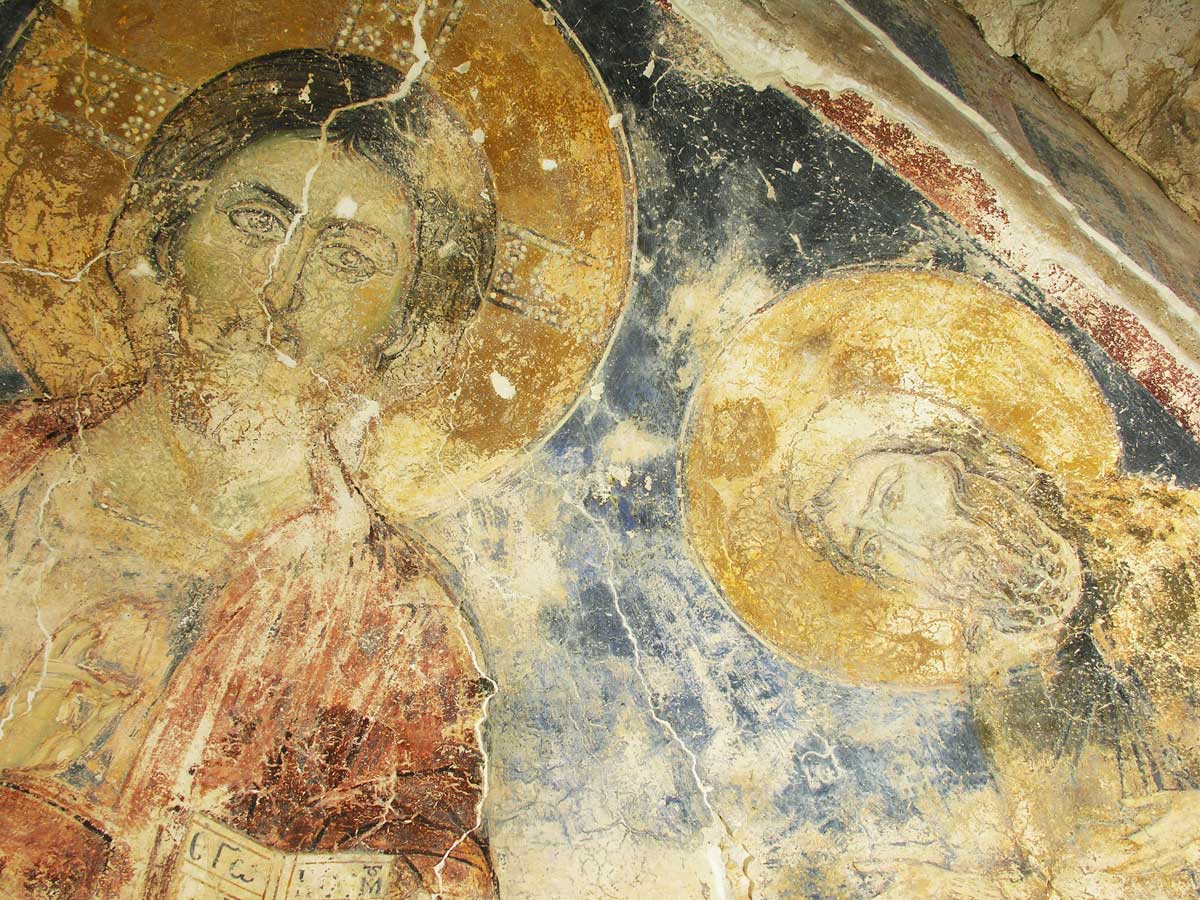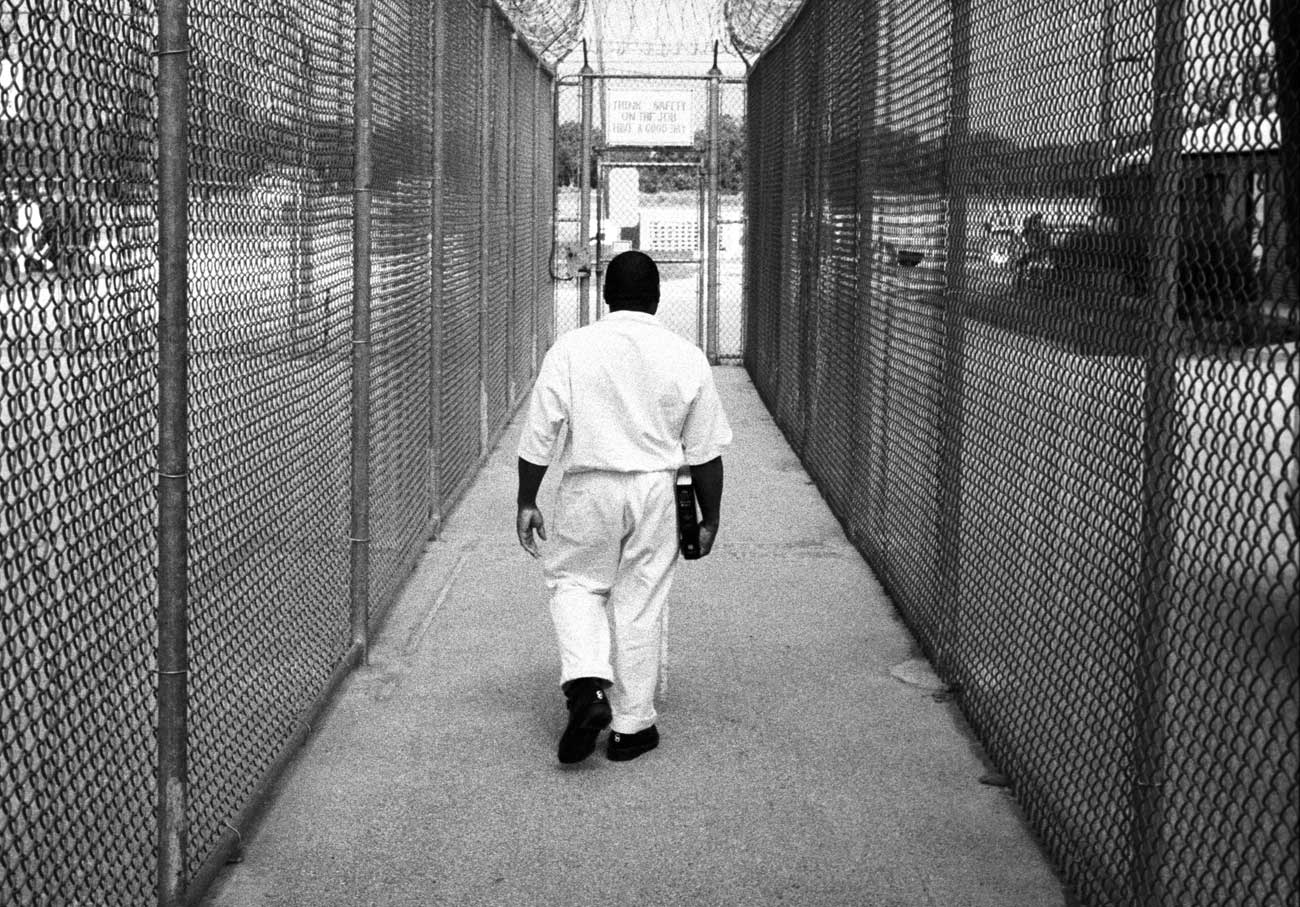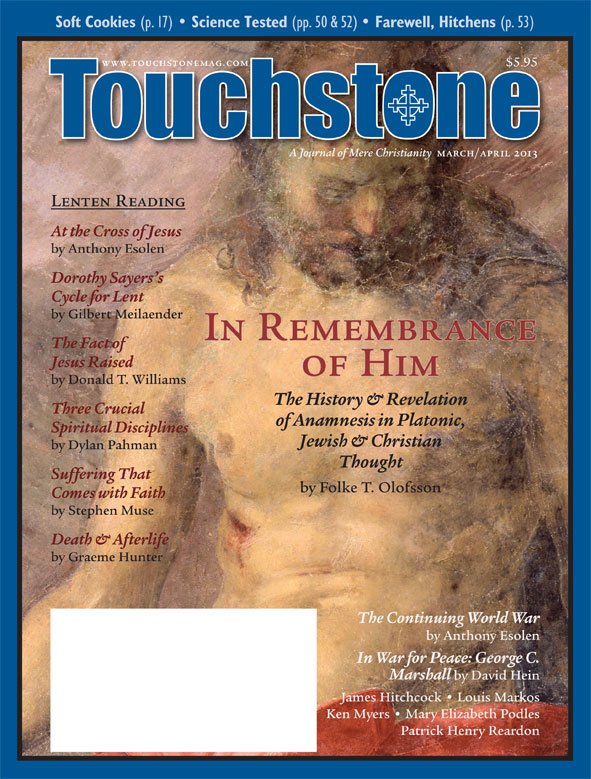No Dead Man's Prayer by Stephen Muse
View
No Dead Man's Prayer
Stephen Muse on the Suffering of Faith & the Paradox of Psalm 88
More than any other scriptural lament, Psalm 88 has for me proved helpful in pastoral psychotherapy with those whose rage, pain, abandonment, and despair have been deeply buried beneath the pride of human self-sufficiency.
A soldier back from his ninth deployment told me, "I feel dead. I think God is being destroyed in my life." He was numb and controlled as he spoke of "picking up the body parts of soldiers in my unit" and described his subsequent visits to the spouses of the men. "What do you say when they ask if he suffered in death and I can't say, 'Yes, he burned to death in agony . . .'?" When he smells meat cooking, he recalls the burning flesh and hair from the IED (Improvised Explosive Device) explosions he witnessed.
At night, he lies awake listening to every sound, returning to the same places in his mind over and over and imagining his teen-age daughter being injured by a world whose danger she is not aware of in the way that he is. "She was elected homecoming queen. Why can't I feel happy for her?" Once, in Iraq, he sought out the wilderness between the Tigris and Euphrates Rivers, hoping for solace in God's presence as he was accustomed to as a boy in the forest around where he grew up. He opened his Bible and read the words, "Beside the rivers of Babylon we wept." "I got angry. God was mocking me."
Like so many combat veterans who say they feel "dead" inside, he had become a man at war within his own body and soul. Already adrift from his former spiritual home, he found himself now in danger of losing the love of his wife and daughter as well, by being rigid, controlling, and angry all the time.
At one point in our work together I handed him the Bible and asked him to read Psalm 88 aloud. (In the American context, because of its vivid language, Eugene Peterson's translation from The Message is the one I use with my clients.) Having been highly controlled and dissociated from his body and feelings for years since his combat experiences, he wept his way through it as the silent cries within him were given voice and experienced within the great liturgical tradition of those whose struggle with God transformed them. When he had finished, I said, "That is not the prayer of a dead man.'"
A Grief Revealed
From his open heart, he spoke for the first time of the deeper, hidden dimensions of his story. He was serving in the medical unit when a bomb exploded on a bus full of children, injuring dozens. Thirty minutes after their arrival, he was in the staging area where the most hopeless were triaged. A sixteen-year-old girl was there who looked into his eyes, mumbled something in Arabic, and was holding onto his finger as she died.
"How can I bring my daughter into this kind of world? She doesn't know the world as I know it." I responded, "And you have lost touch with the part of the world she knows." He was striving to uphold God made in his own human image, a kind of superman that is able to take care of everyone and does not permit human beings to suffer anything they cannot overcome on their own. This is the idolatry of individual self-sufficiency.
"I have heard your sadness. Where is your rage?" I asked. He said that he feared losing God if he touched the rage. "Perhaps I can't trust a Messiah who dies for the people instead of being a super Davidic king who conquers the enemy." This was also the expectation he held of himself, for which he could not forgive himself.
Buried deep inside him along with the rage and self-blame was yet more of his story. At that most precious and holy moment when the girl died, someone ripped away the blanket covering her, and he saw her naked body with one leg blown off to the hip. This reawakened in him a host of logismoi (a Greek word for troublesome thoughts), centered on memories and shame associated with having been repeatedly sexually molested by his 16-year-old babysitter as a boy and some subsequent years of promiscuity. He could not forgive himself for this. His compulsion to control his 16-year-old daughter's dating life upon his return from combat was revealed as a thinly veiled attempt to manage his own struggle to overcome self-hatred, fear, shame, lust, helplessness, anger, and distorted love—all of which threatened to overwhelm him from within.
Absent & False Gods
In my counseling office I have framed some words said to have been scratched into the walls of a Nazi concentration camp: "I believe in the sun, even when it is not shining. I believe in love even when not feeling it. I believe in God, even when he is silent."
Many times I have witnessed the painful, silenced depths of persons become flesh and break into a flood of tears at the very moment they discover Psalm 88 praying itself through them, enlivened by their anger and their loss spoken to God, whom they experience as not being there, a God whom they turn to even when he is absent.
Miguel de Unamuno, the Spanish philosopher, writes, "Those who believe that they believe in God, but without any passion in the heart, without anguish of mind, without uncertainty, without doubt, without an element of despair even in their consolation, believe only in the God-idea, not in God Himself" (Tragic Sense of Life, translated by J. E. Crawford Flitch).
For this veteran soldier, Psalm 88 provided the call and response through which the Holy Spirit dissolved his proud and self-sufficient human illusion of a false and wholly inadequate god. He was re-membered as the Word became flesh once more. Survivors of trauma, including sexual abuse, often feel themselves to be the bad ones, while hoping in a "good" god who, like "good" parents, delivers those he loves from evil. Protecting this imagined god (just like protecting the parents) comes at the price of inward shame, guilt, and rage-filled self-hatred being deeply buried like spiritual shrapnel in the heart, hidden behind a superficially pious persona.
Feuerbach, Freud, and Nietzsche were right about the god of anthropomorphic design. This god is an illusion of human self-sufficiency and self-calming, and not a god at all. The "Lamb slain from before the foundation of the world" hidden in the depths of despair is the true God. The discovery of this One on the other side of the loss of the imagined god who protects us from the consequences of our freedom to resist God is the gift of Psalm 88.
Facing the Psalm
Psalm 88 is a liturgical call and response pointing to the way of God that leads through human suffering and longing for divine intimacy in the face of God's seeming absence and apparent indifference to human suffering. It is a testimony of faith, hope, and ultimately love arising at the meeting place of created nature and the invisible, uncreated God. Our willingness to seek God in the place of our greatest spiritual pain and agony, shorn of all consolation, becomes the furnace through which the false gods created by human will, imagination, desire, and power are melted down. An old Hasidic saying captures the mystery at the heart of the redemptive transformation: "The spirit seeks a body through speech."
At the end of the psalm, there is no turnaround as in Psalm 22. The ending is a continuation of its opening lines. "You've made lover and neighbor alike dump me, the only friend I have left is darkness" is most abrupt. There is no attempt at pious comfort. No Pollyanna reprieve. The full brunt and most feared truth of one's long-held pain, the terrible, unbearable abandonment of God and of all subsequent meaning and hope are the only phylactery. By bringing this to God anyway, the psalm is pregnant with faith and hope. Like Job discovering in the whirlwind what Christ brings forth from the grave as the new Jonah, the mystery that God is God and man is man happens when there is a meeting between them, a "dia-Logos" through Christ, the Logos, uniting flesh and Spirit.
Faith is hidden with the splinter of trauma in the depths of the heart, where, as with Job, there is the opportunity to voice the deep anguish of helplessness, aloneness, and the rage of betrayal to God in words. These are the birth pangs of Psalm 88, which moves through the graveyard rubble of anger, despair, sadness beyond words, defeat, abandonment, moral injury, and spiritual pain, while persisting in seeking the encounter that was incomprehensible to Job's friends, and still is to many in the twenty-first century: "I would talk to God and have him answer!"
Psalm 88 acknowledges a darkness of abandonment so deep that only a resolve as firm as Job's—"Even though he slay me, yet shall I trust him" (Job 13:15)—will find a way there. It is such honesty and persistence that ultimately leads to the encounter that reveals both the essential difference and the possible communion between created human nature and the uncreated God.
The Lord's Abandonment
Those who "suffer" this psalm discover the paradox of One who becomes present only through the full acknowledgment of the experience of his absence. The price of such redemption is a full-faced look into the pain and loss we fear to experience, lest it be discovered that, like my parents and even my own humanity, God, my last hope of the day, is not there.
The psalm's many accusations and sarcasms are true to traumatized experience. Most importantly, the great mystery of the redemptive process of our Lord's own abandonment by God is prefigured here. The opening lines of Psalm 22, "My God, my God, why have you forsaken me?" is the quintessential cry of Psalm 88, uttered at the gates of hell. The Cross of Christ is God's own presence in the experience of humanity's abandonment by God.
Christ our God is found in the unfathomable depths of his own abandonment by God because he has fully assumed all of the uncertainty of the created order. It is the God experienced as absent who upholds the heart when there is nothing and no one to uphold it. As St. Mark the Ascetic observes, "Remembrance of God is suffering of heart endured with devotion to God." From this perspective, real faith is more like what a recovering crack addict once told me, "You don't know you have faith until faith is all you've got."
Many survivors of abuse with whom I have walked the Emmaus road, hearing the rage, sarcasm, confusion, and anguish voiced in the liturgical context of praying this psalm aloud, begin to discover that it is only the absent God revealed through Christ on the Cross, a God with a human heart, abandoned as we are, who is capable of being trusted. This "Lamb slain from the foundations of the world" is prepared to re-birth mankind, from even before the Fall itself, from before creation, through his total, self-offering love, for as Fr. Lev Gillet points out, "There was a cross in the heart of God before there was one outside Jerusalem."
Consolation in Despair
While many Christians will never experience such depths of despair, Psalm 88 remains a spiritual plumb line for all, like Christ's consoling words to the Orthodox ascetic Silouan the Athonite, which came at the point of his greatest struggle and despair: "Keep your mind in hell and despair not." Calling out to God, when all human power has been stripped away, revealing that I am empty and needy, is medicine for the strange hubris of Genesis 3, a reversal of the Fall. It is the essence of deep repentance and intimacy with God. "He who is forgiven much loves much."
Love persisting in the face of darkness is praise of the most beautiful kind, showing forth the presence of Christ, who risks all in the hope that we, too, might become persons as God is person, loving all as we ourselves have been loved. From this, the cry "Abba, Father!" emerges from the human heart, conceived by the Holy Spirit, and Christ is born anew in the most forsaken place of all. In such encounters, the Spirit begins to speak in sighs too deep for words—and the miracle of healing and redemption begins.
Stephen Muse is a pastoral psychotherapist and deacon serving in the Greek Orthodox Church. His most recent books are When Hearts Become Flame and Being Bread (Orthodox Research Institute Press). The Peddler and the Disenchanted Mirror is currently in press with Parrisia Editions.
Order
Print/Online Subscription

Get six issues (one year) of Touchstone PLUS
full online access including pdf downloads for only $39.95. That's only $3.34 per month!
Order
Online Only
Subscription

Get a one-year full-access subscription to the Touchstone
online archives for only $19.95. That's only $1.66 per month!
Order Touchstone subscriptions in bulk and save $10 per sub! Each subscription includes 6 issues of Touchstone plus full online access to touchstonemag.com—including archives, videos, and pdf downloads of recent issues for only $29.95 each! Great for churches or study groups.
Transactions will be processed on a secure server.
more on bible from the online archives

32.2—March/April 2019
That Hideous Food
on Preserving Physical & Spiritual Nourishment by Nathanael Devlin

5.3—Summer 1992
The Bible Tells Me So
Everything You Need to Know About Morality & the Bible by David Mills

27.4—July/August 2014
The Things Freely Given
The Bible, Sacred Theology & the Mind of Christ by Patrick Henry Reardon
more from the online archives

31.1—January/February 2018
Vikings Under the Son
on Ragnarök, an Extreme Weather Event & the Paths to Conversion by Timothy J. Burbery

33.5—September/October 2020
Killing Homicide
on Missing Fathers & Redemption in Prison by Bob Perry

5.3—Summer 1992
The Bible Tells Me So
Everything You Need to Know About Morality & the Bible by David Mills
calling all readers
Please Donate
"There are magazines worth reading but few worth saving . . . Touchstone is just such a magazine."
—Alice von Hildebrand
"Here we do not concede one square millimeter of territory to falsehood, folly, contemporary sentimentality, or fashion. We speak the truth, and let God be our judge. . . . Touchstone is the one committedly Christian conservative journal."
—Anthony Esolen, Touchstone senior editor
Support Touchstone
00














